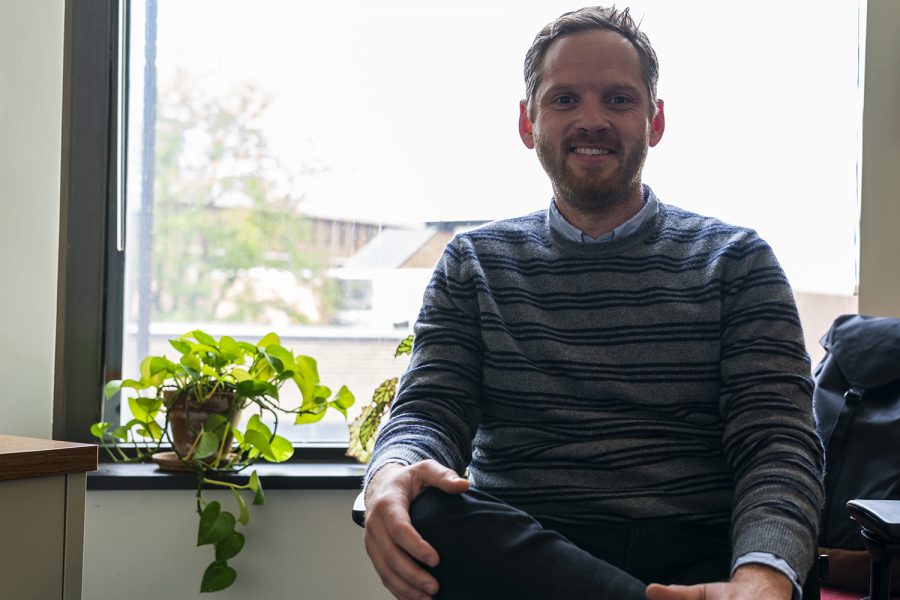New College of Education project aims to treat and prevent substance abuse
A new University of Iowa project funded by the Health Resources and Services Administration will work to treat and prevent substance and opioid abuse. The initiative aims to use telepsychology to help those suffering in rural Iowan towns.
University of Iowa professor, Martin Kivlighan, receives a $1.3 million federal grant to enhance opioid and substance use prevention and treatment. He poses for a portrait.
October 16, 2019
As conversations about how to solve the U.S. opioid crisis continue to be prevalent, a University of Iowa project will look into ways to better treat substance abuse, including opioids.
Mental health care for rural Iowans suffering from substance abuse disorder will be provided through telepsychology — a form of technology that is used for face-to-face counseling communication.
Martin Kivlighan, assistant professor in the University of Iowa College of Education, recently began a new Graduate Psychology Training in Telepsychology Initiative. The project will provide training in prevention and treatment of substance abuse and work to develop a telepsychology clinic in the College of Education, Kivlighan said.
“Our primary value is to serve communities in Iowa that lack the necessary resources to address mental health,” Kivlighan said.
This project was funded by a $1.3 million grant gifted to the College of Education in August by the Health Resources and Services Administration, a federal agency within the U.S. Department of Health and Human Services.
Administration spokesperson Scott Kodish said the Bureau of Health Workforce in his organization works to improve the health of underserved and vulnerable populations by strengthening the health workforce and connecting skilled professionals to communities in need.
The bureau operates and funds programs that expand and improve access to quality opioid and substance use disorder treatment in underserved areas, Kodish said.
RELATED: UI College of Education professor travels to Pakistan to teach education technology
One of the administration’s newest behavioral health programs is the Opioid Workforce Expansion Program for Professionals and Paraprofessionals, he said.
“[The program] enhances community-based training for students preparing to become behavioral health professionals and paraprofessionals focused on opioid use disorder and other substance use disorders,” Kodish said.
The UI received $1,341,925 in funding to work towards the creation of an Opioid Workforce Expansion Program Professionals Specialty Track, Kodish said.
Kivlighan said there is a large need for the state to make resources accessible and effective.
Marie Adams, a UI doctoral student, was one of eight awarded a training fellowship on the project. Adams and her colleagues continue to develop clinical training sites within rural spaces to help improve accessibility of quality mental-health services.
Together, faculty and students are collaborating on incorporating new service modalities, such as telepsychology, to broaden the scope and reach of services they can provide to rural populations, Adams said.
Substance abuse is a mental health issue, Adams said, that has unique physical and psychological symptoms and therefore requires a comprehensive treatment approach. By including counseling into treatment plans, individuals experiencing substance abuse concerns have a better chance of achieving long-term positive outcomes and maintaining sobriety, Adams said.
RELATED: Research warns against substance abuse among college
“There are psychological, social, and cultural factors that go into substance and opioid use. This grant will allow us to train doctoral psychology students to address these multiple factors in the prevention and treatment of substance and opioid use disorders,” Kivlighan said.
Adams said it’s important to focus the project on rural Iowa because that area is in need of mental-health services and treatment options for substance use.
Current micro-systems — comprised of rural hospitals, businesses, charity organizations, and community agencies — can and do exist within rural spaces, yet these systems often have very limited resources available to them, Adams said.
“The geographic placement of these limited resources creates service gaps within the state, further limiting access and choice of primary and preventative healthcare for Iowans,” Adams said. “Serving these populations and addressing these service gaps are essential if we are to develop long-term, sustainable solutions for addressing mental health and substance use issues in Iowa.”






